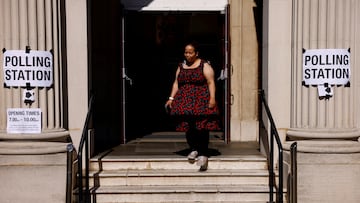POLITICS
What is voted on in the UK? How the ‘first past the post’ voting system works
Voters in the United Kingdom are going to the polls today, with Labour expected to return to government after 14 years of Conservative rule.

The UK’s ruling Conservative Party is expected to be swept out of government for the first time in 14 years today, as voters go to the ballot box in the country’s first general election since 2019.
Pre-election polling places the centre-right Conservatives well behind the centre-left Labour, the other chief political party in British politics. Indeed, the data analytics firm YouGov has the ‘Tories’ 17 points behind Labour, who last governed the UK between 1997 and 2010. A Labour victory - which hasn’t happened in a UK general election since 2005 - would see the party’s leader, Sir Keir Starmer, replace the Conservatives’ Rishi Sunak as prime minister.
What exactly is the UK electorate voting for today?
At UK general elections, which must take place at least every five years, voters in England, Scotland, Wales and Northern Ireland select the 650 members of parliament (MPs) that make up the House of Commons, the lower chamber in the country’s parliament.
Each voter casts their ballot to choose an MP who will represent their district, known in the UK as a ‘constituency’, in the House of Commons. In each of the 650 constituencies across the country, every MP is elected under the ‘first past the post’ system: political parties put forward one candidate each, and the candidate that gets the most votes from local residents wins.
In this countrywide ballot to decide each constituency’s representative in the UK parliament, voters also determine which party or parties will form a new national government, and the identity of the country’s prime minister. The government is usually formed by the party that accrues the most MPs, or seats, in the House of Commons. In turn, that party’s leader becomes the prime minister.
How many MPs are needed for a majority of seats?
To earn a majority in the House of Commons - more MPs than all other parties put together - a party needs to win 326 seats. If no party reaches that figure, the UK is left with a ‘hung parliament’. In this scenario, the party with the most seats can form a minority government or enter into a coalition government with another party.
In 2010, for example, the Conservatives came out of the general election as the largest party in the House of Commons - but their total of 306 MPs fell short of a majority. The ‘Tories’ opted to form a coalition with the Liberal Democrats, whose 57 seats meant that, between them, the two parties had enough MPs for a majority. The Conservative leader at the time, David Cameron, became prime minister, with Nick Clegg, then head of the centre-to-centre-left Lib Dems, installed as deputy prime minister.
In the following general election, in 2015, the Conservatives won 330 seats: a majority, albeit a small one, that allowed them to form a government on their own.

How many MPs is each party expected to get this year?
According to YouGov’s most recent projection, Labour will win 431 seats in today’s general election - a huge, historic figure that would be well above the threshold needed for a House of Commons majority. The Conservatives are projected to win 102 seats, with the Lib Dems the third-largest party on 72. Were this result to occur, it would give Labour 229 more seats than the second-largest party, making it the biggest landslide win by a single party since 1832.
Five years ago, the Conservatives won 365 seats under their former leader Boris Johnson, 163 more than Labour, who at the time were headed up by Jeremy Corbyn.
Why are there critics of the ‘first past the post’ system?
Critics of the ‘first past the post’ system (FPTP) complain that - unlike electoral formats such as proportional representation - it can’t be trusted to offer a faithful reflection of the voting public’s preferences. After all, the winning candidate in each constituency routinely receives less than 50% of the vote; in other words, more constituents voted against their local MP than for them.
And, given that a candidate only needs to win by one vote to become a constituency’s MP, parties can miss out on seats despite receiving significant backing at the ballot box. The BBC notes, for instance, that the anti-immigration party UKIP received 12.6% of the vote nationwide in the 2015 general election - but that support translated into victory in just one constituency.
Thanks, in no small part, to the fact that MPs are elected with under 50% backing from constituents, FPTP also allows parties to pick up a larger percentage of seats than votes. As at constituency level, indeed, the largest party in the House of Commons normally gets less than half the vote, even when it achieves a majority of MPs. The organisation Make Votes Matter, which campaigns for electoral reform in the UK, points out that in the last general election, the Conservatives won 56% of the seats in the Commons, but only 44% of the vote.
“The idea of a minority ruling over the majority goes against our most basic ideas about democracy,” Make Votes Matter says. The scope for disparities between votes and seats, adds Doug Cowan of the Electoral Reform Society, “means that the issues that are important in Westminster aren’t always the same as the issues the public feel most strongly about.”
FPTP can also encourage negative, tactical voting among the British electorate, in a bid not to cast a ‘lost’ vote. Rather than backing a candidate with little chance of becoming the MP for their constituency, people frequently opt not for their preferred alternative, but for the individual most likely to beat a contender they want to keep out of the House of Commons.






